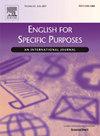当审稿人否定和作者导航时:同行评审评论和作者回复中的否定
IF 2.7
1区 文学
Q1 LINGUISTICS
引用次数: 0
摘要
本研究探讨了否定在同行评议话语中的特征,考察了其在评议者和作者之间的修辞交流中的出现模式。根据发表在《英国医学杂志》上的50篇研究文章的评审意见和通讯作者的回复,我们采用了一种话语信息的方法,研究了否定出现的共同文本环境,而不是将人际功能归因于否定本身。我们根据否定如何与组织信息或表达立场的话语特征共同发生,确定了六种修辞对齐(比较、添加、反驳、对冲、促进和影响)。我们的研究结果表明,虽然审稿人主要使用否定来提供批判性评价和维护权威,但作者则使用否定来捍卫研究选择,并通过对冲和对比来管理分歧。范例交流说明了双方如何在保持合作的同时协商批评。这项研究通过解决新手研究人员和研究生经常难以理解审稿人反馈和写回信的实际需求,为《专用英语》做出了贡献。通过研究否定的修辞运用,我们对同行评议的互动维度有了深入的了解,并为学术写作教学中的批评和反驳策略提供了教学意义。本文章由计算机程序翻译,如有差异,请以英文原文为准。
When reviewers negate and authors navigate: Negation in peer review comments and author responses
This study explores how negation features in peer review discourse, examining patterns of its occurrence in the rhetorical exchanges between reviewers and authors. Drawing on a corpus of reviewer comments and corresponding author responses from 50 research articles published in the British Medical Journal, we adopt a discourse-informed approach that examines the co-textual environments in which negation appears, rather than attributing interpersonal functions to negation itself. We identify six rhetorical alignments (comparison, addition, refutation, hedging, boosting, and affect) based on how negation co-occurs with discourse features that organise information or express stance. Our findings reveal that while reviewers primarily use negation to deliver critical evaluation and assert authority, authors use it to defend research choices and manage disagreement through hedging and contrast. Exemplar exchanges illustrate how both parties negotiate critique while maintaining collegiality. The study contributes to English for Specific Purposes by addressing a practical need that novice researchers and postgraduate students often struggle to interpret reviewer feedback and write response letters. By examining the rhetorical deployment of negation, we offer insights into the interactional dimensions of peer review and provide pedagogical implications for teaching critique and rebuttal strategies in academic writing instruction.
求助全文
通过发布文献求助,成功后即可免费获取论文全文。
去求助
来源期刊

English for Specific Purposes
LINGUISTICS-
CiteScore
5.70
自引率
8.00%
发文量
41
审稿时长
62 days
期刊介绍:
English For Specific Purposes is an international peer-reviewed journal that welcomes submissions from across the world. Authors are encouraged to submit articles and research/discussion notes on topics relevant to the teaching and learning of discourse for specific communities: academic, occupational, or otherwise specialized. Topics such as the following may be treated from the perspective of English for specific purposes: second language acquisition in specialized contexts, needs assessment, curriculum development and evaluation, materials preparation, discourse analysis, descriptions of specialized varieties of English.
 求助内容:
求助内容: 应助结果提醒方式:
应助结果提醒方式:


